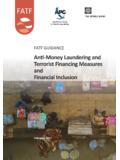Transcription of OECD 50th Anniversary Vision Statement
1 OECD Paris2, rue Andr -Pascal, 75775 Paris Cedex 16 Tel.: 33 (0) 1 45 24 82 00 OECD 50th Anniversary Vision StatementC/MIN(2011)6 Meeting of the OECD Council at Ministerial LevelParis, 25-26 May 2011 (2011)6 OECD 50th Anniversary Vision Statement On the 50th Anniversary of the OECD, we, the Members, reaffirm our founding goals and set out our Vision for the OECD s evolution to ensure its effective and influential role in a rapidly changing world so as to promote the well-being of our citizens. We are determined that the OECD will continue to help countries develop policies together to promote economic growth and healthy labour markets, boost investment and trade, support sustainable development, raise living standards, and improve the functioning of markets.
2 This Vision also underscores our resolve to make the OECD a more effective and inclusive global policy network. Throughout its history, the OECD, whose origins lie in the Marshall Plan, has assisted countries in fostering good governance and reforming and improving their economic policies to generate greater economic growth. The success of these efforts helped build a wider consensus for market economies and democracy. The OECD is a world leader in designing structural reforms that promote growth and equity. Its committees of national experts, high-quality Secretariat, world-class data collection and analysis, robust peer reviews, and evidence-based policy recommendations help countries by benchmarking policies and disseminating best practices.
3 Its collaborative work with regulators and policy makers, industry leaders, trade unions, and civil society brings key stakeholders together to share ideas and learn from each other, and to develop best practices, policy guidelines, and legal instruments. The global economic environment has changed dramatically in recent years. The 2008-09 financial and economic crisis underscored the increased complexity and interconnectedness of today s world, the on-going central importance of growth and employment, as well as the need for more effective regulation of the financial sector and enhanced co-operation to address common concerns.
4 Challenges related to still too high unemployment, public-sector debt levels, and generating sustainable balanced growth around the world have to be addressed effectively. The mobility of capital, technology, and people is increasing rapidly. New economic powers have emerged and integrated into the world economy, leading to global shifts in growth, wealth, and influence. In this changing world, OECD Members continue to form a community of nations committed to the values of democracy based on rule of law and human rights, and adherence to open and transparent market-economy principles.
5 The Organisation s essential mission is to promote stronger, cleaner, fairer economic growth and to raise employment and living standards. We rely on it to do so by identifying key economic, social and environmental policy challenges and designing policies to improve the well-being of people around the world. Better Policies for Better Lives. The OECD will continue working to improve the functioning of markets and of governments, resist protectionism, encourage fair and efficient systems of taxation and investment, and create good jobs.
6 Promoting the openness, propriety, integrity, and transparency of business and governments and fighting against corruption remain key activities for the Organisation. New challenges, however, demand new approaches. The OECD will incorporate the lessons of the recent crisis to help update economic thinking and analytical frameworks. We will actively pursue strategies for growth and jobs by making the best use of OECD expertise in multidisciplinary analysis and structural reforms.
7 Sustainable economic growth is a critical objective and future OECD strategies will promote green growth. The OECD will also provide countries with the tools to increase economic opportunity for women in education, employment and entrepreneurship. In order to increase growth in our economies, generate jobs and increase living standards, we look to the OECD to help spur private-sector innovation. The OECD will work to develop effective strategies to increase employment opportunities toward the goal of shared prosperity.
8 It will also support high-quality education and skills, health, and social-protection policies, which are critical in the global economy to reduce inequality and support inclusive growth. The OECD will help governments respond to demographic challenges, including rising social protection costs as a result of ageing populations and youth unemployment. C/MIN(2011)6 3 Our New Paradigm for Development. Countries at varying levels of development contribute to the achievement of global sustainable economic growth.
9 We can all prosper by learning from one another, generating ideas together, and co-ordinating and improving our policies, regulations, and standards, based on the principles of inclusiveness and flexibility. Broader interaction, beyond the provision of aid, supports economic growth, poverty reduction, and development. We commit to launch a new comprehensive approach to development across our Organisation entailing greater collaboration, including sharing policy successes and failures and engaging in mutual learning, as well as deepening partnerships between the Organisation and developing countries that want to engage.
10 In addition, we will continue to identify strategies to ensure that the broader policies pursued by our governments are coherent with our desire to promote worldwide development as stated in the OECD Convention. This approach will build on the Organisation s rich experience with development co-operation, respect the different needs and challenges of developing countries, and incorporate best practices emerging from co-operation between them. We reaffirm our commitment to aid as well as the priority we give to achieving the Millennium Development Goals.















